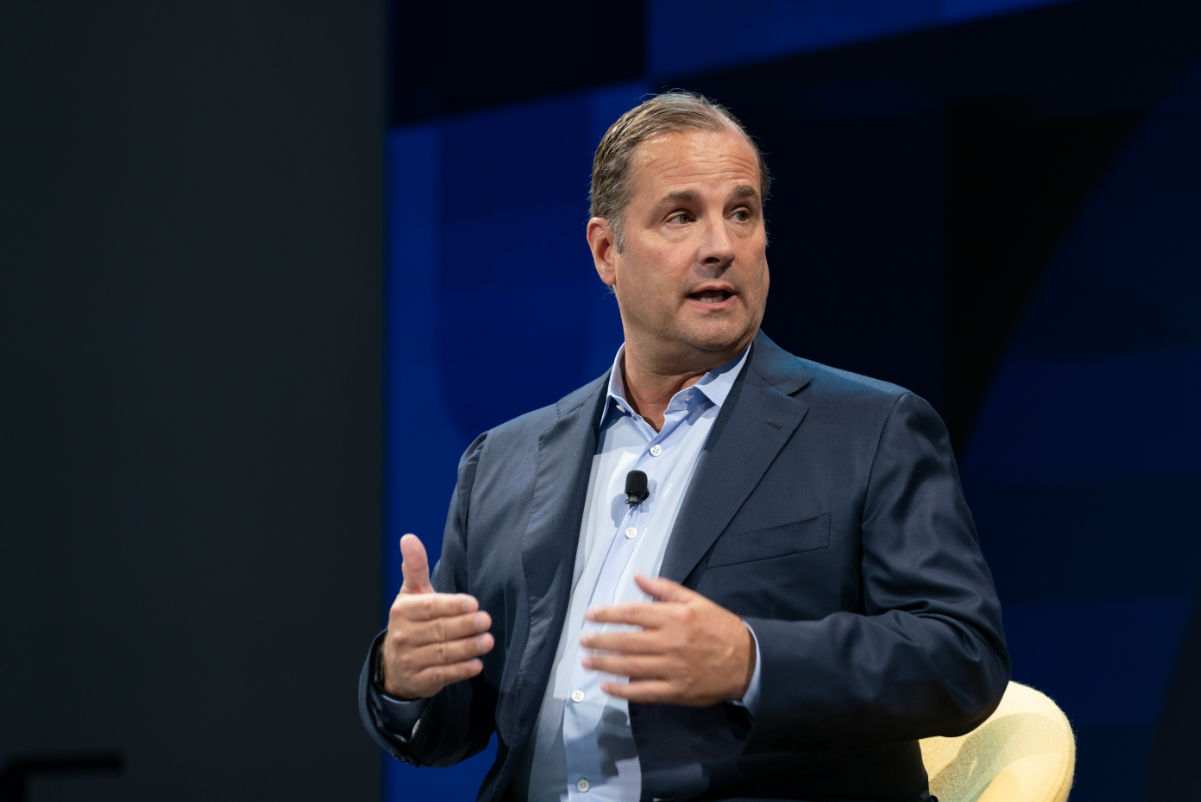Skift Take
Good for Marriott CEO Anthony Capuano for showing leadership on this urgent issue, which affects the whole U.S. travel industry, not just hotels.
The top boss of Marriott International used an on-stage interview on Thursday as a platform to call on the U.S. federal government to do more to cut the wait times for interviews for first-time visitor visa applicants, which he said was leading to lost revenue because of reduced U.S. inbound tourism.
CEO Anthony Capuano, who leads the world’s largest hospitality company, was interviewed at an annual meeting run by the U.S. Chamber of Commerce, a business advocacy group. Capuano was asked which policies his team would press President Biden’s Administration on for industry benefit.
“Certainly reducing visa wait times, particularly for those countries that have the potential, would be the most impactful, in terms of sheer volume of visitors,” Capuano said. “I had a chance to talk with the Commerce Secretary [Gina Raimondo], and we talked about the fact that in some countries the average wait times right now exceed 400 days. So we are losing out on billions and billions of dollars of travel spend.”
Capuano also encouraged federal policy changes that would put more federal workers on the road and back in offices and a reform package for U.S. immigration policy in a way that would boost worker numbers.
The U.S. Travel Association last month created a website to highlight what it called the negative impact the visa delays are having on travelers and U.S. businesses. The organization projected that the U.S. would lose nearly $7 billion in travel spending in 2023 because between two million and six million people may be unable to visit this year despite applying to do so.
Some would-be travelers are more affected than others, with India, Brazil, Colombia, and Mexico among those reporting high wait times. Citizens from many countries outside the U.S. Visa Waiver Program must apply for a visitor visa in order to temporarily stay in the U.S., as Skift has reported.
Wait times and reasons for delay vary by consulate. Some consulates lost staff during the pandemic and a hiring freeze under the previous U.S. presidential administration. Demand has also soared on a surge of interest in post-pandemic travel and because many applicants must renew visas that expired during the pandemic. (See Skift’s coverage of the visa delays.)
U.S. Hotel Bookings Stay Strong
Capuano gave a brief update on Marriott International’s business, though not a full report. The company will report its earnings within a few weeks.
In October, Marriott’s global revenue per available room, a key industry metric, was up about 3 percent over where it was in 2019.
“There’s been lots of discussion around whether we’ve hit the bottom of the pool of accommodation demand,” Capuano said. “We just don’t see it in the data. In fact, if you look at the performance we saw through Thanksgiving, and if you look at the forward bookings through the holiday season, you see really, really strong and compelling numbers.”
Capuano cautioned that recessionary headwinds could impact 2023 performance but he remained optimistic.
“As we look at the forward data into 2023, we’re really encouraged by the activity that we see,” Capuano said.
Blended Travel as Executive Talking Point
Many travelers have been combining business and leisure trips for a long time, but blended travel has come of age as the pandemic has eased. As Skift noted in its 2023 Megatrends, what’s new is that executives see the behavior as an important one to talk about and strategically respond to.
“It will get a little more difficult in the coming years to talk with great precision about [hotel business] segments [such as business, leisure, and group] because of this trend we’ve seen emerge over the pandemic, a blended purpose to travel,” Capuano said. “That is great news for our business. We see it in our hotels….. By [changed booking behaviors by] day of the week, more and more folks are combining leisure and business travel.”
Marriott has responded to the trend by working to make sure it has enough internet bandwidth in its hotels to handle if all guests are doing Zoom calls simultaneously, for example. The company has also been rethinking its fitness offerings and its food and beverage offerings to provide other services more flexibly as a guest’s needs change during the course of a stay.
“Folks have learned they can conduct business from almost anywhere, … and if necessary, they can do it remotely,” Capuano said. “That is something that I think will continue long beyond the end of the pandemic. The ability to work from almost anywhere is fueling the ability to say, ‘I’m going to tack on a couple of days of leisure pre- or post-business trip, and I think it’s great news for our industry.'”
CORRECTION: This article originally misidentified the U.S. Commerce Secretary.
Daily Lodging Report
Essential industry news for hospitality and lodging executives in North America and Asia-Pacific. Delivered daily to your inbox.
Have a confidential tip for Skift? Get in touch
Tags: ceo interviews, hotel development, marriott, visas
Photo credit: Marriott International CEO Anthony Capuano is shown here talking at Skift Global Forum 2022 in New York. Source: Skift.
